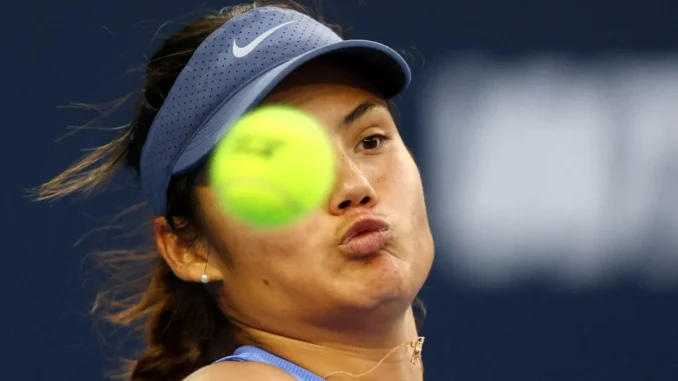
In the sweltering crucible of professional tennis, where physical and mental fortitude collide under blazing lights, Emma Raducanu’s latest chapter has unfolded as a gripping tale of triumph deferred. The 22-year-old British firebrand, whose improbable 2021 US Open triumph as a qualifier remains one of sport’s greatest fairy tales, is once again grappling with the cruel whims of her body. Her first-round heartbreak at the Ningbo Open in China—a grueling 6-3, 4-6, 1-6 defeat to world No. 219 wildcard Zhu Lin—hasn’t just extended a frustrating losing streak; it’s thrown a shroud of uncertainty over her immediate calendar, particularly the eagerly anticipated Hong Kong Open. As fans in the region hold their breath, Raducanu’s visible physical torment raises the specter of another withdrawal, echoing last year’s painful absence and testing the resolve of a player who’s battled back from the brink before.
The Ningbo showdown began with all the promise of a comeback story. Raducanu, drawing on the tactical brilliance that dismantled foes in New York, traded brutal baseline rallies with Zhu in a first set that felt like a heavyweight bout. Four consecutive service breaks turned it into a 59-minute chess match, but the Brit held firm, clinching 6-3 on her fifth set point with a thunderous serve. Her powerful groundstrokes whistled like missiles, exploiting Zhu’s slide from a career-high No. 31—derailed by injuries just two years prior. At that moment, the 22-year-old seemed poised for dominance, her movement fluid despite the oppressive 89 percent humidity that clung to the court like a second skin.
But tennis, ever the great equalizer, flipped the script in the second set. Raducanu dropped serve early, digging deep to claw back to 3-4. Then, at 4-3 down, alarm bells rang: she slumped into a medical timeout, trainers wrapping her in a towel as they checked her blood pressure. The conditions—humid but mercifully cooler than Wuhan’s blistering 36°C from the week before—appeared to exacerbate lurking fatigue. Returning with grit, she held to level at 4-4, only for momentum to evaporate. Zhu, battling her own serving jitters, pounced with a break to seal 6-4, her resilience shining through.
The third set was a harrowing descent into despair. Raducanu surrendered serve immediately, then began wincing, clutching her lower back and stretching awkwardly between points. A second timeout was inevitable; she lay flat on the court for agonizing minutes as the physio kneaded her troubled spine. Treatment offered little relief—her lateral quickness vanished, turning every retrieval into a labored shuffle. Zhu sensed blood, reeling off the final four games for a merciless 6-1 decider. In a match spanning two hours and 27 minutes, the Chinese star claimed 16 of the last 19 points, leaving Raducanu to limp across the finish line, her dreams in tatters.
This Ningbo nightmare caps a torturous Asian odyssey, marking Raducanu’s third straight defeat. It follows her Wuhan Open opener abandonment against Ann Li, where dizziness struck at 6-1, 4-1 amid 60 percent humidity and soaring heat. Medics monitored her pulse and blood pressure then, too—a chilling pattern of late-season fragility. Post-Wuhan, Raducanu bared her soul on social media: “Last day at the doctor’s in Wuhan… feeling better now. Shame I couldn’t continue there, but thank you for the messages.” Her update blended optimism with the raw toll of adversity, a warrior’s creed amid the chaos.
Zhu, magnanimous in victory, painted a vivid picture of shared suffering during her on-court interview. “It was a very tough match, I couldn’t find my rhythm, but I kept moving, kept patient, to get the rhythm, to get the final set,” she shared. “Also, there were some issues with Emma in the final set. It’s not easy for both of us, it’s very near the end of the season.” Her empathy highlighted the tour’s endgame exhaustion, amplified by Raducanu’s plight.
The fallout is seismic. Raducanu eyes the Pan Pacific Open in Tokyo from October 20, then Hong Kong’s WTA 250 a week later—a event she forfeited last year to injury, disappointing local fans craving their homecoming hero. That nagging lower back issue now jeopardizes both, with the Australian Open just three months away. Melbourne holds cherished memories: four straight years beyond the first round, a platform to build momentum. But prolonged rehab could shatter that streak, forcing a scramble for 2026 seeding.
Peering deeper into 2025, Raducanu’s arc reveals brilliance eclipsed by brittleness. Flashes of US Open magic persist—a Queen’s Club quarterfinal crowning her British No. 1, steady Aussie progress—but her 5-9 three-set ledger screams endurance gaps. She’s dropped her last five deciders, including gut-wrenching collapses: squandering match points to world No. 5 Jessica Pegula in Beijing’s China Open (6-0 third-set wipeout) and two-time Slam queen Barbora Krejcikova in Seoul’s Korea Open (6-1 breaker). The blueprint is clear: explosive starts crumbling under strain, a foe she must conquer to rejoin the elite.
Courtside in Ningbo, her inner circle rallied—hitting partner Alexis Canter and trainer Daniel Pohl at her side, coach Francisco Roig guiding remotely from Barcelona. It’s a tight-knit fortress, but the physical siege rages on. Echoes of 2023’s wrist and ankle surgeries linger, fueling fears of burnout. “I need to push harder physically,” Raducanu has vowed, eyeing a signature shot as her “weapon” for top-20 security Down Under.
As recovery takes center stage, the tennis world unites in hope. Will she defy the odds for Tokyo and Hong Kong glory, scripting redemption in the East? Or prioritize healing for a roaring 2026 return? The days ahead hold the verdict. From Flushing Meadows’ roar to Asia’s humid haze, Raducanu’s spirit—that unquenchable fire—promises she’s far from finished. Fans worldwide, especially in Hong Kong’s vibrant streets, await her next defiant step, racket in hand, destiny hers to seize.
Leave a Reply